The global EV battery recycling and black mass processing market is projected to grow from USD 8.6 billion in 2025 to approximately USD 29.7 billion by 2035, recording an absolute increase of USD 21.1 billion over the forecast period. This translates into a growth of 245% over the decade. The market is forecast to expand at a compound annual growth rate (CAGR) of 13.1%, with the overall market size projected to grow by nearly 3.5x by the end of the forecast period.
The market is growing as electric vehicle adoption accelerates worldwide, creating a surge in end-of-life batteries that require sustainable management. Governments, particularly in the EU, the US, and Asia, are enforcing stricter regulations on recycling, critical mineral recovery, and circular economy practices. Black mass, rich in valuable materials like lithium, nickel, cobalt, and manganese, has become central to reducing reliance on mining and addressing raw material shortages. Rising battery production costs, coupled with geopolitical supply risks, are driving automakers and battery makers to secure secondary supply chains through recycling, boosting market expansion.
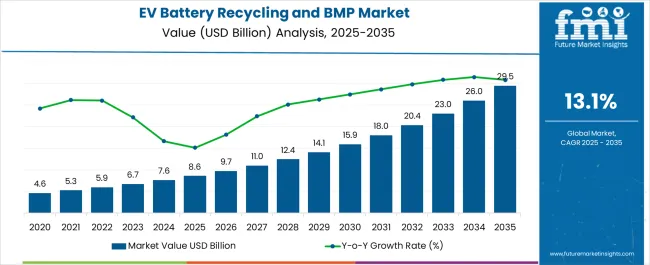
| Metric | Value |
|---|---|
| Industry Size (2025E) | USD 8.6 billion |
| Industry Value (2035F) | USD 29.7 billion |
| CAGR (2025 to 2035) | 13.1% |
From 2020 to 2024, the market rose from USD 2.5 billion to USD 7.1 billion, propelled by accelerating EV adoption and growing awareness of critical material scarcity. Early commercial recycling facilities and pilot-scale black mass processing projects established the foundation for enterprise adoption. Battery manufacturers and automotive OEMs led early implementation, while specialized recycling companies began comprehensive black mass recovery operations, establishing the groundwork for the 2025-2035 expansion cycle.
Between 2025 and 2030, the market is projected to expand from USD 8.6 billion to USD 16.3 billion, adding approximately USD 7.7 billion. Growth in this first phase will be supported by increasing EV adoption driving end-of-life battery volumes and regulatory mandates for battery recycling across major automotive markets. Electric vehicle manufacturers are emerging as major demand drivers, seeking sustainable closed-loop supply chains while addressing critical material supply constraints and regulatory compliance requirements. From 2030 to 2035, the market is expected to grow from USD 16.3 billion to USD 29.7 billion, a further increase of USD 13.4 billion. This second phase will be shaped by massive EV battery retirement waves, advanced black mass processing technologies, and the development of integrated recycling ecosystems optimized for specific battery chemistries. Technology refresh cycles will emphasize direct cathode recycling and closed-loop material recovery, while regulatory developments will focus on harmonizing recycling standards and mandating minimum recycled content across global markets.
The increasing scarcity and price volatility of critical battery materials, including lithium, cobalt, and nickel, are creating compelling economic incentives for comprehensive battery recycling and black mass processing. These materials represent up to 70% of battery manufacturing costs, making recovery and reuse essential for supply chain sustainability. Resource constraints are driving systematic evaluation and adoption of closed-loop recycling technologies across automotive manufacturers, battery producers, and specialized recycling facilities, creating sustained demand for advanced black mass processing capabilities and integrated material recovery systems.
Government regulations worldwide are implementing mandatory recycling targets and extended producer responsibility frameworks that require comprehensive battery lifecycle management. The EU Battery Regulation mandates 70% recycling efficiency by 2030, while similar regulations in China, the US, and other major markets are establishing minimum recycled content requirements for new batteries. These regulatory frameworks are accelerating adoption of black mass processing systems, creating compliance-driven demand across automotive and battery manufacturing sectors.
The exponential growth in EV sales from 2018-2024 is creating an unprecedented wave of end-of-life batteries requiring processing and material recovery. First-generation EV batteries are reaching retirement age, while manufacturing scrap and production waste continue expanding with increased battery production capacity. This growing feedstock availability is driving investment in scalable black mass processing facilities and advanced hydrometallurgical recovery systems, creating opportunities for specialized recycling companies and integrated material recovery operations.
The market is segmented by recycling process into hydrometallurgical processing, pyrometallurgical processing, and direct cathode recycling. By battery chemistry recycled, the market includes NMC (Nickel-Manganese-Cobalt), LFP (Lithium Iron Phosphate), and others including NCA and solid-state batteries. End application segmentation comprises cathode precursor manufacturing, lithium carbonate/hydroxide production, and industrial/chemical applications. Regionally, the market is segmented into North America, Europe, Asia-Pacific, Latin America, and the Middle East & Africa.
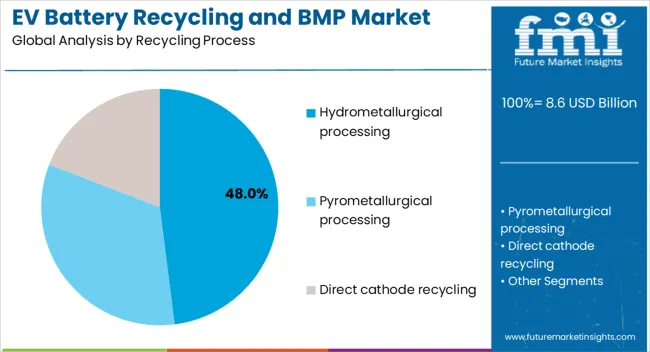
Hydrometallurgical processing applications are projected to command a dominant 48% share of the EV battery recycling market by 2025, establishing their position as the primary technology for black mass processing and critical material recovery. Their deployment in commercial-scale facilities benefits from superior material recovery rates exceeding 95% for lithium, cobalt, and nickel, providing comprehensive recycling solutions that address both economic and environmental requirements. These processes offer excellent selectivity and purity in recovered materials, making them suitable for direct reintegration into battery manufacturing supply chains.
The widespread adoption of hydrometallurgical processing is driven by its efficiency in processing diverse battery chemistries and its ability to produce battery-grade recovered materials without significant quality degradation. Battery manufacturers' commitment to sustainable supply chains provides regulatory confidence and ecosystem support, facilitating enterprise adoption across diverse recycling applications. While pyrometallurgical processing and direct recycling serve important market segments, hydrometallurgical processing offers the scalability, material recovery efficiency, and product quality necessary for mainstream deployment, positioning these technologies as the cornerstone of EV battery recycling strategies for companies seeking both material security and environmental compliance.
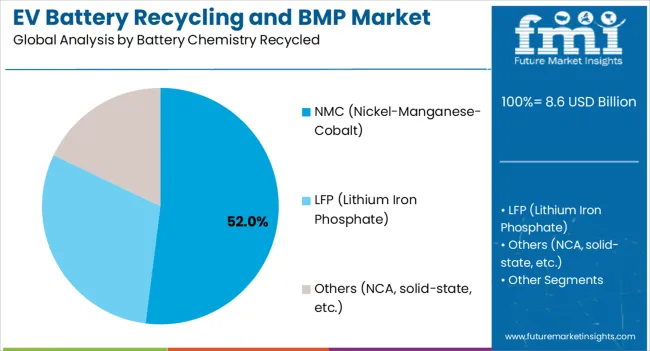
NMC (Nickel-Manganese-Cobalt) battery recycling is set to account for 52% of battery chemistry processing in 2025, reflecting the automotive industry's widespread adoption of NMC batteries for EV applications and their high critical material content. Battery recyclers face substantial opportunities to recover valuable materials, including nickel, manganese, cobalt, and lithium, from NMC batteries, making this chemistry particularly attractive for commercial-scale recycling operations. Processing facilities are placing heightened focus on NMC-specific recovery processes, making material purity optimization a top priority for organizations targeting automotive supply chain integration.
LFP (Lithium Iron Phosphate) recycling represents 28% of applications, with growing volumes from entry-level EVs and energy storage systems requiring cost-effective recovery solutions focused primarily on lithium recovery. Other battery chemistries, including NCA and emerging solid-state technologies, account for 20% of the market, encompassing specialized processing requirements for high-nickel chemistries and next-generation battery formats. In all cases, battery chemistry-specific processing provides organizations with optimized material recovery solutions that address both current feedstock availability and anticipated chemistry evolution, establishing NMC and LFP recycling as the primary drivers of market expansion.
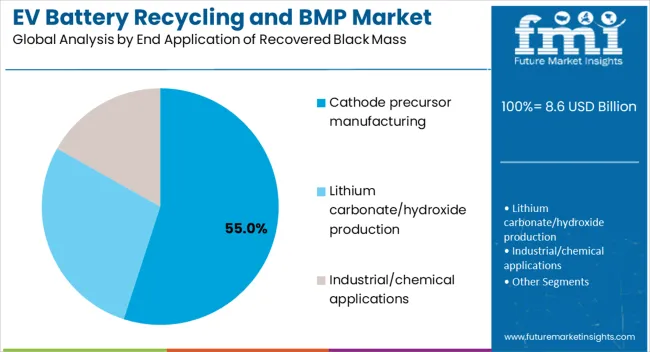
Cathode precursor manufacturing applications are forecasted to capture 55% of the black mass processing market in 2025, highlighting the strategic importance of integrating recycled materials directly into battery manufacturing supply chains. These applications enable closed-loop material flows with excellent cost competitiveness compared to virgin materials, while providing supply chain security for battery manufacturers. Black mass-derived precursors offer equivalent performance characteristics compared to traditional mining-based alternatives, enabling seamless integration into existing cathode manufacturing processes.
Beyond supply chain advantages, cathode precursor applications support comprehensive sustainability goals using recovered critical materials, enabling organizations to achieve both cost reduction and environmental objectives across battery manufacturing operations. Advanced processing technologies allow optimization of precursor specifications and chemical compositions, enabling organizations to tailor material properties before full-scale production integration. Lithium carbonate/hydroxide production, accounting for 27% of applications, remains essential for battery electrolyte and cathode manufacturing, while industrial/chemical applications represent 18% of the market for specialized chemical processing and non-battery applications, reflecting the diverse value recovery opportunities across different black mass processing applications.
Recycling companies are increasingly developing sophisticated leaching and solvent extraction processes that significantly optimize material recovery rates, processing efficiency, and economic viability for commercial black mass processing operations. These advanced hydrometallurgical systems incorporate precise pH control, selective extraction agents, and multi-stage purification processes that enhance critical material recovery while minimizing processing waste and environmental impact. Research institutions and recycling companies are collaborating to develop proprietary processing technologies that address specific battery chemistry requirements, from high-nickel NMC systems to emerging solid-state battery formats requiring specialized recovery approaches.
The evolution of processing technology extends beyond recovery optimization to encompass energy efficiency and environmental sustainability throughout the recycling process. Companies are implementing innovative reactor designs that utilize renewable energy sources and eliminate harmful chemical byproducts, making battery recycling increasingly sustainable compared to primary material extraction.
Advanced process control systems enable precise monitoring of recovery efficiency and product quality, resulting in consistent battery-grade materials across large-scale processing operations. These developments provide comprehensive recovery frameworks that enable cost-competitive alternatives to virgin materials across multiple battery applications, while establishing recycling as a viable long-term supply chain solution for critical battery materials.
Advanced recycling implementations increasingly incorporate direct integration capabilities with battery manufacturing processes, combining efficient material recovery with sophisticated quality control, material specification, and supply chain logistics that optimize overall manufacturing cost and sustainability.
These integrated systems utilize advanced material characterization that coordinates recovered material specifications with battery manufacturing requirements, ensuring seamless integration of recycled materials into cathode precursor production and electrolyte manufacturing. Supply chain integration enables recycling facilities to participate in long-term material supply contracts, generating stable revenue streams while supporting battery manufacturer sustainability goals and cost reduction objectives.
The integration extends to hybrid processing architectures that combine multiple recycling technologies based on feedstock chemistry and target product requirements, creating optimized solutions for specific battery types and manufacturing applications. Advanced logistics systems enable coordinated collection of end-of-life batteries, processing scheduling, and delivery of recovered materials based on real-time manufacturing demand, material specifications, and pricing conditions, maximizing economic returns while ensuring supply chain reliability.
Material tracking platforms provide comprehensive traceability and certification capabilities that enable battery manufacturers to verify recycled content and meet regulatory requirements for sustainable material sourcing. This integration enables organizations to build circular economy ecosystems that address both cost optimization and environmental sustainability requirements, while supporting the transition to closed-loop battery material supply chains.
Battery recycling facilities are developing comprehensive automated processing systems that optimize battery disassembly, black mass recovery, and material purification processes through advanced robotics, artificial intelligence, and real-time quality monitoring tailored to specific battery chemistries and recovery requirements. These automated systems incorporate precision battery handling equipment that ensures safe disassembly and efficient material separation, while advanced sorting technologies provide optimal feedstock preparation for downstream processing. Machine learning algorithms analyze processing data in real-time to identify optimal operating parameters and predict material recovery outcomes, enabling proactive adjustments that maintain consistent product quality and recovery efficiency.
Quality control automation extends throughout the entire recycling process, from incoming battery inspection to final recovered material testing and certification. Advanced analytical systems utilize spectroscopic analysis and chemical characterization to verify material purity and specifications during processing, while automated packaging equipment ensures proper handling and storage of recovered materials. Statistical process control systems provide continuous monitoring of key performance indicators, including recovery rates, product purity, and processing efficiency, enabling facilities to maintain tight quality specifications while maximizing throughput and minimizing operating costs.
These comprehensive automation platforms enable systematic scaling of battery recycling operations while reducing processing costs and maintaining stringent quality standards throughout the recovery process, supporting the transition from pilot-scale operations to commercial-scale deployment across the global recycling industry.
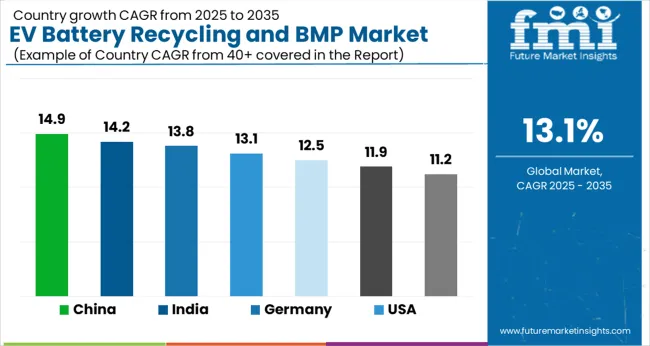
China's EV battery recycling market is projected to grow at 14.9% CAGR through 2035, the highest globally. Leading companies including CATL and GEM Co. have established comprehensive recycling facilities and black mass processing capabilities that provide definitive material recovery solutions for automotive and battery manufacturing adoption. Government policies supporting circular economy development and critical material security are driving systematic implementation across state-owned enterprises and private recycling companies. The country's leadership in EV production and battery manufacturing creates competitive advantages, accelerating comprehensive adoption across automotive recycling, material recovery, and chemical processing sectors.
India's EV battery recycling market is expected to expand at 14.2% CAGR, supported by government subsidies for recycling plant development and national circular economy initiatives under sustainability missions. The country's rapid EV adoption and government targets for electric mobility require comprehensive end-of-life battery management solutions that can operate effectively in diverse regulatory environments. Government investment in recycling infrastructure is driving awareness of black mass processing benefits across automotive manufacturers and battery producers. Manufacturing incentives are accelerating adoption of integrated recycling systems for addressing material security and environmental compliance requirements.
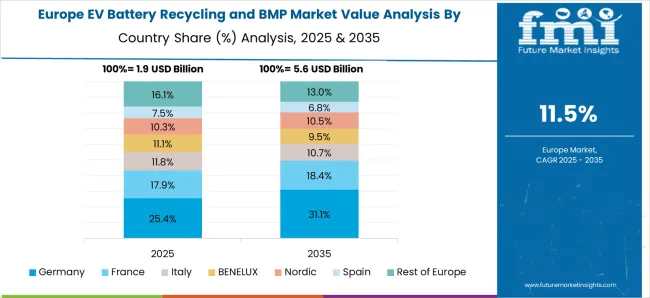
German EV battery recycling market is projected to grow at 13.8% CAGR, driven by EU Battery Regulation mandating 70% recycling efficiency by 2030 and dedicated alternative material supply funding. The country's automotive manufacturing sector is implementing comprehensive recycling systems to ensure compliance with regulatory requirements while reducing dependence on primary material imports. Government investment in recycling technology development is driving advancement of European black mass processing capabilities and supply chain integration. Regulatory requirements for recycled content are accelerating adoption of advanced processing systems for supporting automotive manufacturing and battery production operations.
The USA EV battery recycling market is expected to grow at 13.1% CAGR, supported by Department of Energy grants for Li-ion recycling hub development and Inflation Reduction Act incentives for domestic material processing. National laboratories and recycling companies are implementing advanced processing technologies for commercial-scale material recovery and supply chain integration. Federal investment in critical materials processing is creating awareness of recycling benefits for energy security and supply chain independence. Major automotive manufacturers are adopting integrated recycling systems to meet domestic content requirements while reducing material costs and environmental impact.
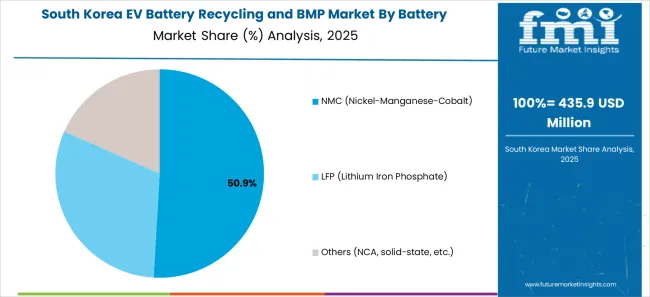
The South Korea EV battery recycling market is projected to expand at 12.5% CAGR, reflecting leading battery manufacturers LG and SK investing comprehensively in black mass recovery capabilities and material processing infrastructure. These companies are implementing advanced recycling technologies for cost-effective material recovery and supply chain integration solutions. Government initiatives supporting recycling technology development are creating opportunities for integrated processing systems and closed-loop material flows. Battery manufacturers are implementing comprehensive recycling systems for reducing material costs while maintaining supply chain security and regulatory compliance.
France's EV battery recycling market is expected to grow at 11.9% CAGR, focused on Umicore leadership in cathode precursor manufacturing and EU-backed supply chain development initiatives. The country's materials processing industry is implementing advanced recycling technologies for integrated precursor manufacturing and supply chain optimization. Government investment in recycling infrastructure is driving early adoption of black mass processing technology across specialized applications and manufacturing integration. EU funding for material processing is accelerating adoption of recycling systems across automotive and battery manufacturing supply chains.
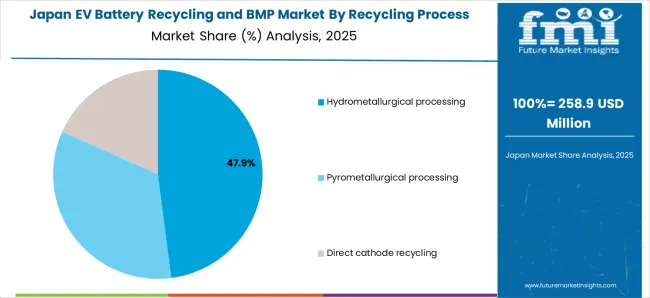
Japan's EV battery recycling market is projected to grow at 11.2% CAGR, driven by Panasonic-led recycling initiatives and comprehensive domestic EV battery processing strategies. Japanese battery manufacturers are developing advanced recycling technologies for material recovery and supply chain integration applications. The country's automotive industry is adopting integrated recycling systems for addressing material security and regulatory compliance requirements. Government support for recycling technology development is accelerating adoption of processing systems across specialized applications and manufacturing integration initiatives.
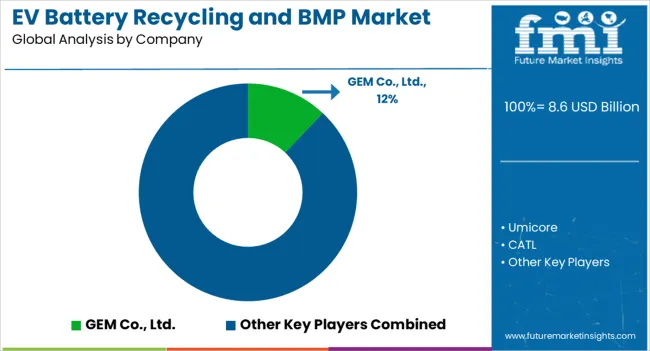
The EV battery recycling and black mass processing market is rapidly evolving, characterized by intense competition between established materials processing companies, emerging recycling specialists, and integrated automotive supply chain providers. With growing concerns over critical material supply constraints and increasing regulatory requirements, organizations across all sectors are under pressure to implement comprehensive recycling solutions that provide reliable material recovery and supply chain integration.
As a result, technology providers are prioritizing development of advanced processing platforms that combine efficient material recovery with scalable manufacturing integration, while also ensuring cost competitiveness and regulatory compliance across diverse recycling applications. Another area of innovation lies in automated processing and quality control systems, where providers combine advanced separation technologies with tailored recovery processes, enabling organizations to execute systematic battery recycling deployment while maintaining operational efficiency and material quality. GEM Co., Ltd. is projected to lead the market with a 12% share in 2025, leveraging its comprehensive recycling infrastructure and successful commercial-scale processing operations across multiple battery chemistries. The company's strength lies in its integrated approach, combining advanced hydrometallurgical processing with large-scale facility operations, technical consultation services, and ongoing support throughout material recovery lifecycles.
| Item | Value |
|---|---|
| Quantitative Units | USD 8.6 billion |
| Recycling Process | Hydrometallurgical processing, Pyrometallurgical processing, Direct cathode recycling |
| Battery Chemistry Recycled | NMC (Nickel-Manganese-Cobalt), LFP (Lithium Iron Phosphate), Others (NCA, solid-state, etc.) |
| End Application | Cathode precursor manufacturing, Lithium carbonate/hydroxide production, Industrial/chemical applications |
| Regions Covered | North America, Europe, East Asia, South Asia & Pacific, Latin America, Middle East & Africa |
| Countries Covered | China, India, Germany, United States, South Korea, France, Japan |
| Key Companies Profiled | GEM Co., Ltd., Umicore, CATL, Li-Cycle, Redwood Materials, Glencore, Huayou Cobalt, Fortum, Retriev Technologies, Stena Recycling, Ecobat |
| Additional Attributes | Dollar sales by recycling method and battery chemistry, regional demand trends, competitive landscape, buyer preferences for mechanical versus hydrometallurgical processes, integration with circular economy and ESG compliance, innovations in black mass recovery, solvent-free processing, energy efficiency, material purity optimization, and sustainable end-of-life battery management |
The global EV battery recycling and black mass processing market is estimated to be valued at USD 8.6 billion in 2025.
The market size for the EV battery recycling and black mass processing market is projected to reach USD 29.5 billion by 2035.
The EV battery recycling and black mass processing market is expected to grow at a 13.1% CAGR between 2025 and 2035.
The key product types in EV battery recycling and black mass processing market are hydrometallurgical processing, pyrometallurgical processing and direct cathode recycling.
In terms of battery chemistry recycled, nmc (nickel-manganese-cobalt) segment to command 52.0% share in the EV battery recycling and black mass processing market in 2025.






Full Research Suite comprises of:
Market outlook & trends analysis
Interviews & case studies
Strategic recommendations
Vendor profiles & capabilities analysis
5-year forecasts
8 regions and 60+ country-level data splits
Market segment data splits
12 months of continuous data updates
DELIVERED AS:
PDF EXCEL ONLINE
EV Transmission System Market Size and Share Forecast Outlook 2025 to 2035
EV Charger Converter Module Market Forecast Outlook 2025 to 2035
EV Charging Panelboard Market Forecast Outlook 2025 to 2035
Evacuated Miniature Crystal Oscillator (EMXO) Market Forecast and Outlook 2025 to 2035
EV Charging Tester Market Size and Share Forecast Outlook 2025 to 2035
Evaporative Air Cooler Market Size and Share Forecast Outlook 2025 to 2035
EV Charging Cable Market Size and Share Forecast Outlook 2025 to 2035
EVOH Encapsulation Film Market Size and Share Forecast Outlook 2025 to 2035
eVTOL Charging Facilities Market Size and Share Forecast Outlook 2025 to 2035
Event Tourism Market Size and Share Forecast Outlook 2025 to 2035
EV Telematics Control Systems Market Size and Share Forecast Outlook 2025 to 2035
Evidence Collection Tubes Market Size and Share Forecast Outlook 2025 to 2035
EVA Coated Film Market Size and Share Forecast Outlook 2025 to 2035
EV Charging Management Software Platform Market Size and Share Forecast Outlook 2025 to 2035
EV Traction Inverter Market Size and Share Forecast Outlook 2025 to 2035
EV Plant Construction Market Size and Share Forecast Outlook 2025 to 2035
EV Charging Station Market Analysis - Size, Share, and Forecast Outlook 2025 to 2035
Event Logistics Market Size and Share Forecast Outlook 2025 to 2035
Evaporated Filled Milk Market Size, Growth, and Forecast for 2025 to 2035
EV Lighting Market Growth - Trends & Forecast 2025 to 2035

Thank you!
You will receive an email from our Business Development Manager. Please be sure to check your SPAM/JUNK folder too.
Chat With
MaRIA